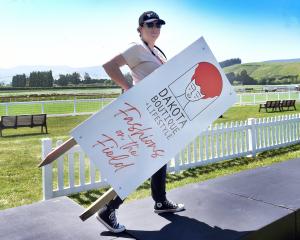Thousands of people gathered throughout Otago yesterday to remember the end of World War 1.
Armistice Day services were held throughout the country at the 11th hour of the 11th day of the 11th month, to commemorate the end of the war, which was described in Dunedin as the slaughter of a generation.
More than 100 people gathered around the Dunedin Cenotaph at Queens Gardens and others paid tribute at the Robbie Burns statue in the Octagon.
Guest speaker Prof Tom Brooking, of the University of Otago's history department, said World War 1 was the greatest tragedy in the world up to that time.
During the four and a-half-year war, 10 million people, mostly soldiers, were killed - the ''worst record in European history'', Prof Brooking said.
''To compound the misery, at exactly the same time of the armistice, influenza broke out around the world, killing another 40 million.''
Prof Brooking said New Zealand's World War 1 casualty rate was the worst per capita of any Allied dominion.
''We had a population of about 1.1 million and lost more than 18,500 men, who were either killed in action or from wounds.
"It was worse for the French, Germans, Turks and Serbians, but in a way the loss was worse for a small close-knit community like New Zealand,'' he said.
''Men served from every single part of the country and everyone in New Zealand knew someone who was killed in the First World War.''
He said for all the heartache, the war was not futile because those who fought did so in the belief they were defending open society and democracy.
''Most New Zealanders, male and female, and particularly Pakeha supported the war. So, too, did many iwi, including Ngai Tahu in this part of the country,'' he said.
''They fought for freedom and all that entails, and as long as we remember that, then there's no fear that we will forget the extraordinary efforts made by those brave men in appalling conditions, or the support of their wives and children,'' Prof Brooking said.
The Robbie Burns cannon and a 105mm howitzer were fired, and wreaths were laid by Dunedin RSA president Jenepher Glover, Dunedin Mayor Dave Cull, honorary naval officer Tony Buchanan and HMNZS Toroa commanding officer Lieutenant-commander Rob Tomlinson.
Balmacewen Intermediate School pupils sang a hymn and Ralph Miller, of Dunedin, played the Last Post.
About 50 people gathered at Mosgiel's service at the Cenotaph in central Mosgiel, where an address was given by military historian Huia Ockwell.
In Arrowtown, about 35 people attended an Armistice Day service at the Arrowtown war memorial.
Parade marshall Don Spary and army chaplain Fr Tony Harrison led the service, at which bagpiper Keith Cameron and bugler Martin Wightman played.
- Additional reporting James Beech











